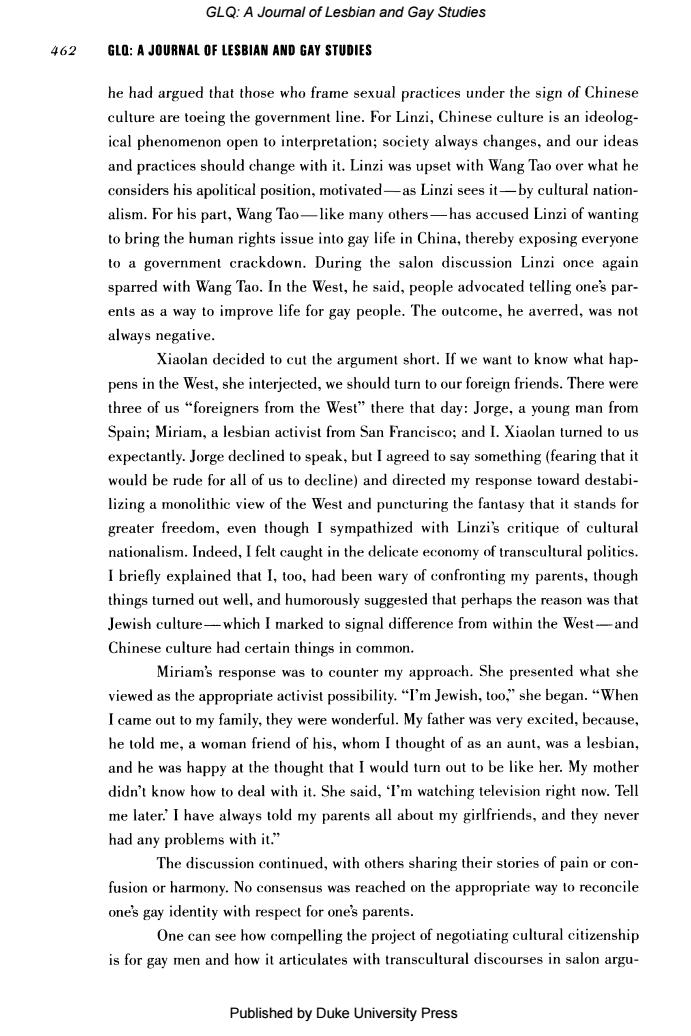正在加载图片...

GLQ:A Joumal of Lesbian and Gay Studies 462 GLQ:A JOURNAL OF LESBIAN AND GAY STUDIES he had argued that those who frame sexual practices under the sign of Chinese culture are toeing the government line.For Linzi,Chinese culture is an ideolog- ical phenomenon open to interpretation;society always changes,and our ideas and practices should change with it.Linzi was upset with Wang Tao over what he considers his apolitical position,motivated-as Linzi sees it-by cultural nation- alism.For his part,Wang Tao-like many others-has accused Linzi of wanting to bring the human rights issue into gay life in China,thereby exposing everyone to a government crackdown.During the salon discussion Linzi once again sparred with Wang Tao.In the West,he said,people advocated telling one's par- ents as a way to improve life for gay people.The outcome,he averred,was not always negative. Xiaolan decided to cut the argument short.If we want to know what hap- pens in the West,she interjected,we should turn to our foreign friends.There were three of us "foreigners from the West"there that day:Jorge,a young man from Spain;Miriam,a lesbian activist from San Francisco;and I.Xiaolan turned to us expectantly.Jorge declined to speak,but I agreed to say something(fearing that it would be rude for all of us to decline)and directed my response toward destabi- lizing a monolithic view of the West and puncturing the fantasy that it stands for greater freedom,even though I sympathized with Linzi's critique of cultural nationalism.Indeed,I felt caught in the delicate economy of transcultural politics. I briefly explained that I,too,had been wary of confronting my parents,though things turned out well,and humorously suggested that perhaps the reason was that Jewish culture-which I marked to signal difference from within the West-and Chinese culture had certain things in common. Miriam's response was to counter my approach.She presented what she viewed as the appropriate activist possibility."I'm Jewish,too,"she began."When I came out to my family,they were wonderful.My father was very excited,because, he told me,a woman friend of his,whom I thought of as an aunt,was a lesbian, and he was happy at the thought that I would turn out to be like her.My mother didn't know how to deal with it.She said,I'm watching television right now.Tell me later.I have always told my parents all about my girlfriends,and they never had any problems with it." The discussion continued,with others sharing their stories of pain or con- fusion or harmony.No consensus was reached on the appropriate way to reconcile one's gay identity with respect for one's parents. One can see how compelling the project of negotiating cultural citizenship is for gay men and how it articulates with transcultural discourses in salon argu- Published by Duke University Press462 GLO: A JOURNAL OF LESBIAN AND GAY STUDIES he had argued that those who frame sexual practices under the sign of Chinese culture are toeing the government line. For Linzi, Chinese culture is an ideological phenomenon open to interpretation; society always changes, and our ideas and practices should change with it. Linzi was upset with Wang Tao over what he considers his apolitical position, motivated-as Linzi sees it- by cultural nationalism. For his part, Wang Tao-like many others-has accused Linzi of wanting to bring the human rights issue into gay life in China, thereby exposing everyone to a government crackdown. During the salon discussion Linzi once again sparred with Wang Tao. In the West, he said, people advocated telling one’s parents as a way to improve life for gay people. The outcome, he averred, was not always negative. Xiaolan decided to cut the argument short. If we want to know what happens in the West, she interjected, we should turn to our foreign friends. There were three of us “foreigners from the West” there that day: Jorge, a young man from Spain; Miriam, a lesbian activist from San Francisco; and I. Xiaolan turned to us expectantly. Jorge declined to speak, but I agreed to say something (fearing that it would be rude for all of us to decline) and directed my response toward destabilizing a monolithic view of the West and puncturing the fantasy that it stands for greater freedom, even though I sympathized with Linzi’s critique of cultural nationalism. Indeed, I felt caught in the delicate economy of transcultural politics. I briefly explained that I, too, had been wary of confronting my parents, though things turned out well, and humorously suggested that perhaps the reason was that Jewish culture-which I marked to signal difference from within the West-and Chinese culture had certain things in common. Miriam’s response was to counter my approach. She presented what she viewed as the appropriate activist possibility. “I’m Jewish, too,” she began. “When I came out to my family, they were wonderful. My father was very excited, because, he told me, a woman friend of his, whom I thought of as an aunt, was a lesbian, and he was happy at the thought that I would turn out to be like her. My mother didn’t know how to deal with it. She said, ‘I’m watching television right now. Tell me later.’ I have always told my parents all about my girlfriends, and they never had any problems with it.” The discussion continued, with others sharing their stories of pain or confusion or harmony. No consensus was reached on the appropriate way to reconcile one’s gay identity with respect for one’s parents. One can see how compelling the project of negotiating cultural citizenship is for gay men and how it articulates with transcultural discourses in salon arguGLQ: A Journal of Lesbian and Gay Studies Published by Duke University Press